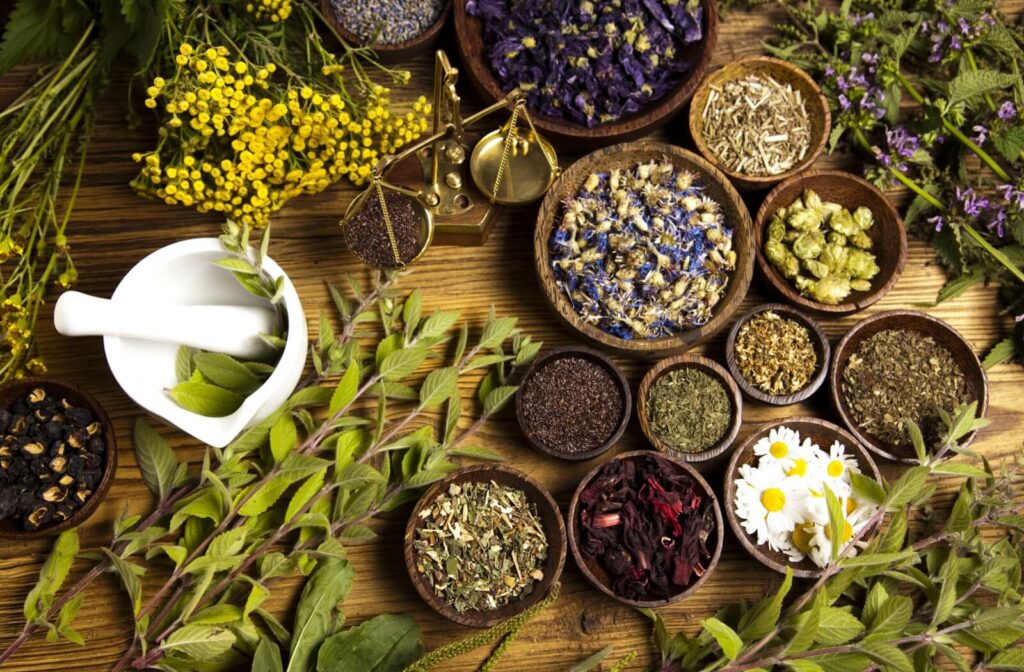Fading memories are often a difficult part of aging. Some forgetfulness can be attributed to age-related memory changes. However, memory loss from cognitive impairment is not a normal part of aging.
For those managing the challenges of memory loss, seeking natural remedies such as herbs can address cognitive decline and improve cognition. Memory care programs in senior living communities can also support loved ones with cognitive challenges by providing personalized care and services.
It’s important to acknowledge that while natural remedies can complement traditional treatments, always consult healthcare providers before introducing anything new, especially for older adults.
Understanding Memory Loss in Aging
Age-related memory loss in older adults can include occasional forgetfulness, difficulty learning new information, and forgetting recent events. However, memory loss from cognitive impairment can look a little different and significantly affect day-to-day functioning and quality of life:
- Becoming disoriented in neighborhoods they are familiar with
- Using unusual words when referring to familiar objects
- Forgetting the names of close family members and friends
- Difficulty recalling old memories
- Not being able to complete tasks independently
For caregivers and family members seeking to help their loved ones, it’s important to approach memory support holistically. Lifestyle changes such as regular physical activity, a balanced diet, and social engagement are fundamental. But what role can herbs play in this spectrum of care?
Common Herbs for Memory Support
Several herbs have shown promise in managing memory and cognitive function. Here’s a brief overview to consider when researching potential herbal supplements for older adults.
Ginkgo Biloba
Ginkgo biloba may support improved cognitive function in those with early-stage Alzheimer’s disease. Pharmacological compounds in Ginkgo biloba include flavonoids and terpenoids. In in vitro, pre-clinical, and clinical studies, Ginkgo biloba functions as the following:
- Provides antioxidants
- Improves mitochondrial function
- Stimulates cerebral blood flow
- Blocks neural cell death
- Stimulates neurogenesis
Ashwagandha
Ashwagandha, also known as Indian ginseng or winter cherry, is an herb used in Ayurvedic medicine for centuries. It contains several compounds known for their antioxidant properties.
One study showed that ashwagandha root extract given to subjects with mild cognitive impairment showed significant improvements in memory tests, executive function, sustained attention, and information-processing speed.
Bacopa Monnieri
This lesser-known herb, also referred to as Brahmi, has a long history in Ayurvedic medicine, mostly recommended for mental stress, memory loss, epilepsy, insomnia, and asthma.
Functions of Bacopa monnieri include:
- Provides antioxidants
- Contains anti-inflammatory properties
- Improves memory
- Improves attention
- Enhances executive function
- Inhibits neural cell death
- Delays brain aging
Studies on Bacopa monnieri have suggested it may improve mental control, logical memory, and paired association learning, which is encouraging.
Gotu Kola
Gotu kola is a staple herb used in Chinese, Indonesian, and Ayurvedic medicine. It’s believed to promote intelligence and improve memory. Gotu kola is often used because of its following potential benefits:
- Reduces oxidative stress
- Promotes dendritic growth
- Improves mood and memory
Cat’s Claw
Cat’s claw is a tropical vine and gets its name because it resembles a cat’s claw. It contains compounds known for their immune-modulating and anti-inflammatory effects. Pre-clinical studies show that cat’s claw may be effective in combating memory loss and cognitive decline in pre-Alzheimer’s and Alzheimer’s disease.
Functions of cat’s claw include:
- Anti-inflammatory
- Antioxidant
- Inhibits plaques and tangles
- Improves memory
Saffron
Saffron is a spice that is also commonly recommended for its medicinal properties. In one study, patients who took saffron for treatment of mild to moderate Alzheimer’s disease showed significantly better outcomes on cognitive performance and suggested its safety and effectiveness in mild to moderate Alzheimer’s disease.
Turmeric
Turmeric is a rhizome plant, bright yellow and orange in color. It has polyphenolic compounds called curcuminoids. There are numerous beneficial functions of turmeric. It serves as an:
- Antioxidant
- Anti-inflammatory
- Antimicrobial
- Inhibitor of neural cell death
In animal models, studies have shown significant improvements in cognitive function with the supplementation of turmeric. However, more research in clinical studies is needed to examine the effects on human cognitive functioning.
Tips for Usage
While herbs for memory loss can sound promising, it’s important to approach herbal remedies with the same care as any other treatment. Natural does not always mean safe, and it doesn’t guarantee efficacy. The human body is a complex system that responds uniquely to different inputs.
When considering the usage of these herbs, understanding dosages and possible interactions is crucial. Medicinal herbs and dosages should still be approached with care, followed by careful observation, and administered based on a healthcare provider’s recommendation.
Holistic Approach in Memory Care
While there is no cure for cognitive impairment from Alzheimer’s disease and other types of dementia, studies have explored the potential of medicinal herbs as a therapeutic approach to treat mild to moderate cognitive issues.
If you have a loved one with memory problems, contact our team at Maumee Pointe. We’ll tell you more about our holistic approach with comprehensive support and personalized care offered in our memory care program.

